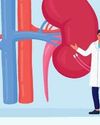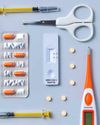As a nurse and certified diabetes care and education specialist Joe Trotter is always telling patients to be prepared for anything. That was on his mind in March 2020, he says, when it gradually became clear he hadn’t followed his own advice.
“There was more and more news about [COVID], and it seemed to be escalating,” recalls Trotter, who has type 1 himself. Living in a big city, he’d always taken its resources for granted, assuming that if he ever needed something in a pinch, “I’d just go out and get it.”
That calculus changed with the pandemic bearing down. If he was going to suggest to patients that stocking up on critical supplies was in their best interest, Trotter realised there was no reason that advice shouldn’t also apply to himself. “I realised I should probably do some planning ahead; that maybe I should take preparedness a little more seriously, and not only for COVID but for emergencies in general.”
Toward that end, Trotter says, he bought finger-stick glucose monitors and test strips he could use if there came a time when his primary CGM wasn’t available. He worried that his pump, which is charged by USB, would no longer work if the power went out, so he contacted his provider and secured a prescription for a long-acting insulin he could use if he needed to adopt a basal-bolus routine. He made sure he had extra pen needles on hand, and he bought extra batteries for all of his devices. And he spent some time refreshing his regular medicine cabinet, replenishing his shelves with basic necessities like ibuprofen, cold and sinus medications, and first-aid supplies like alcohol swabs and Band-Aids.
This story is from the {{IssueName}} edition of {{MagazineName}}.
Start your 7-day Magzter GOLD free trial to access thousands of curated premium stories, and 9,000+ magazines and newspapers.
Already a subscriber ? Sign In
This story is from the {{IssueName}} edition of {{MagazineName}}.
Start your 7-day Magzter GOLD free trial to access thousands of curated premium stories, and 9,000+ magazines and newspapers.
Already a subscriber? Sign In

A whole new world
Being diagnosed with type 1 diabetes as an adult can be a challenging and confusing time. In this extract from the JDRF's new book, Straight to the Point, they explain what's going on and what to say to people who make uninformed comments about your condition

5 Days 5 Dinners
Weeknights are sorted with these fresh, flavoursome mains, packed with veg!

Fantastic Feta
This soft, white cheese with Greek origins is versatile and packs a flavour punch, with only a small amount needed to jazz up a dish

My story: "I'm proud of the fact that I've gotten hold of my health"
When Natalie Rixon, now 33, discovered she had prediabetes soon after she'd turned 20, it was a shock and a relief all rolled into one. What she did next changed her future.

INTERPRETING YOUR cgm DATA
A continuous glucose monitor is a wonderful source of information but do you really know what you're looking at?

7 NEED-TO-KNOW FACTS ABOUT...diabetes & kidney disease
Diabetes is the most common cause of Chronic Kidney Disease. Learn more about this condition and how to protect yourself from developing it.

GET OFF THE diet ROLLERCOASTER
Dietitian Lyndi Cohen wants you to take a deep breath and think about your weight, and health, in a whole new way.

WHAT IS Wegovy?
Meet Wegovy, the new once-weekly weightloss injection that research shows helps people lose significantly more body weight than those using diet and exercise alone.

MEDICATION & CONSUMABLES
Insulin is available on the Pharmaceutical Benefits Scheme (PBS).

DOLLARS AND DIABETES
When you have type 1 diabetes, it's important to see a variety of health professionals regularly to keep your health on track.